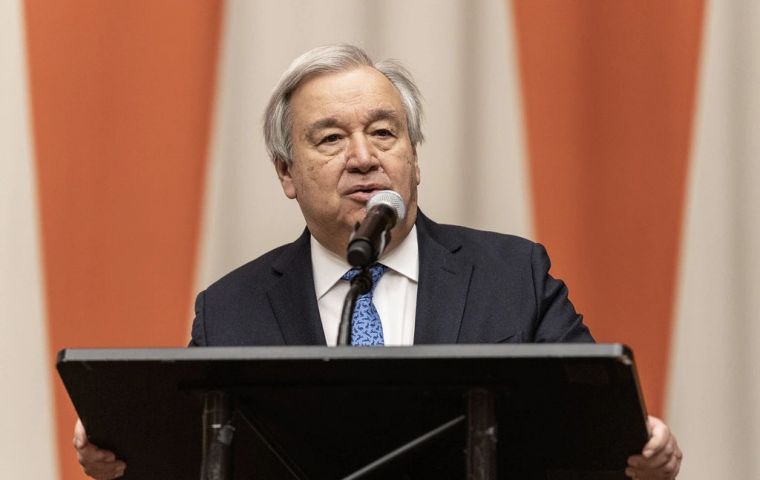MercoPress. South Atlantic News Agency
Guterres warns climate bomb ticking
 “Our world needs climate action on all fronts,” Guterres insisted
“Our world needs climate action on all fronts,” Guterres insisted United Nations Secretary-General António Guterres said Monday in a recorded appearance before a UN Intergovernmental Panel on Climate Change (IPCC) that in order to avoid a climate catastrophe, carbon emissions must be halved by 2030 because “the climate bomb is ticking.”
The Portuguese diplomat also warned that “the climate time bomb was ticking” because “the rate of temperature increase over the last half-century is the highest in 2000 years. Carbon dioxide concentrations are at their highest in at least 2 million years. The climate time bomb is ticking.”
Guterres also launched “a survival guide for mankind” and also urged developed countries to commit to achieving zero net emissions by 2040. “In short, our world needs climate action on all fronts: everything, everywhere, all at once,” he said.
A report released Monday summarized the findings of three expert assessments published between 2021 and 2022 that looked at the physical science, impacts, and mitigation of climate change. The summary report is designed to provide clarity to policymakers as they consider additional actions to reduce emissions. The document was published after nine years of study by members of the IPCC.
The 37-page preliminary report was drawn from thousands of pages of previous assessments after a week of deliberations in Interlaken, Switzerland. The 10,000-page study will also serve as a guide for a global inventory of climate change and individual state contributions that will take place this year at the COP28 climate summit. Under the 2015 Paris Agreement, nations are also expected to update their climate commitments by 2025.
“We have the tools to avoid and reduce the risks of the worst impacts of the climate crisis, but we must seize this moment to act now,” said US Climate Envoy John Kerry.
According to the IPCC, emissions must be halved by the mid-2030s if the world is to have any chance of limiting temperature rise to 1.5 degrees Celsius above pre-industrial levels, a key target enshrined in the Paris agreement.
“If we act now, we can still secure a sustainable livable future for all,” said IPCC Chairman Hoesung Lee. On current trajectories, the planet is on track to warm by 3.2°C by the end of the century, and temperatures could still rise by at least 2.2°C even if existing commitments are met. Average temperatures are already 1.1 °C higher than 1850-1900 levels, leading to more extreme weather events worldwide.
Hoesung Lee said: ”We have the knowledge, the technology, the tools, the financial resources (...) to overcome the climate problems we have identified,“ but ”at the moment what is lacking is the political will,“ acknowledged the Korean economist.
The new report is the first to be published since the historic 2015 Paris Agreement, which set as its main objective, for nearly 200 countries on the planet, to limit the increase in the planet's average temperature to +2°C, ideally +1.5°C. The average global temperature will reach +1.5°C above pre-industrial levels sometime between 2030 and 2035, due to human activity. That projection is valid under almost all scenarios of near-term human greenhouse gas emissions, taking into account their accumulation over the past century and a half, according to the report's findings. However, ”deep, rapid and prolonged emission reductions (...) would lead to a visible slowdown in global warming in about two decades,” the text adds.




Top Comments
Disclaimer & comment rulesCommenting for this story is now closed.
If you have a Facebook account, become a fan and comment on our Facebook Page!